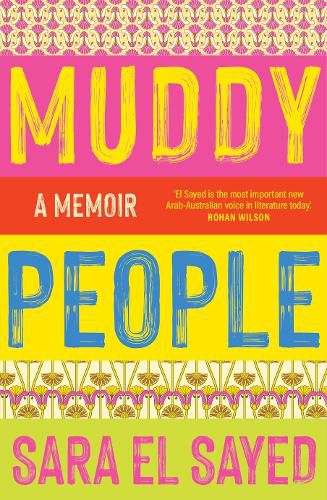Muddy People: A Memoir by Sara El Sayed
Muddy People is the warm and welcoming debut memoir from Egyptian-born Brisbane-based writer Sara El Sayed. As vividly realised as the book’s enticing cover, El Sayed’s stories centre on her relationships with her family (her Mama, Baba, maternal grandmother Nana, older brother Mohamed and younger sister Aisha) and the trials and tribulations of growing up in suburban Brisbane, after moving there from Alexandria in 2001.
Told in loose chronological order under chapter titles that mimic some of the many household rules El Sayed grew up with – for example, ‘Rule #2 Good Girls Don’t Wear Bikinis’ and ‘Rule #5 Don’t Play Allah’ – these stories of her youth are recounted with sharp wit and illuminating detail. It is a history populated with familiar millennial cultural touchstones like the Saddle Club, the Sims (the subject of the hilarious aforementioned Rule #5 chapter), the self-conscious bodily mortification of school swimming carnivals (Rule #2) and the lurid thrill of the Dolly Doctor sealed sections. Scattered in between these autobiographical flashbacks are chapters that focus on El Sayed’s mother and father – their histories and personalities. Within these chapters El Sayed untangles difficult family legacies such as her mother being disowned by her maternal grandfather, the fractures that led to her parents’ divorce, as well as her father’s recent cancer diagnosis.
Contrary to the melodrama of many Hollywood coming-of-age stories, Muddy People is full of small, bright moments – the kind of seismic internal shifts in understanding where a person starts to find their place in this world. Some of the stories had me genuinely laughing out loud, as El Sayed describes the gross indignity of being assigned a baritone tuba instead of a glamourous saxophone in the primary school orchestra, or the sheer Australian terror of being tailed by a murderous magpie on a bike ride home from school. El Sayed doesn’t shy away from instances of racism and Islamophobia that were lobbed at her in her youth. One of her earliest memories of Australia is of a neighbour telling her ‘your rubbish doesn’t belong on our street’ when she – a tiny child – decides to bury a time capsule in their front yard. It’s heartbreaking to read but El Sayed writes these moments simply and matter-of-factly, letting the truth of Australia’s prejudice stand in its own ugly light. It’s there too in smaller moments, like when a doctor tells her father he’s been ‘difficult’ for the nurses during his cancer treatments.
Above all, however, this is a book about family, and readers who loved Benjamin Law’s The Family Law or Alice Pung’s Unpolished Gem will relish this tender and vulnerable debut from a rising star in Australian literature.



